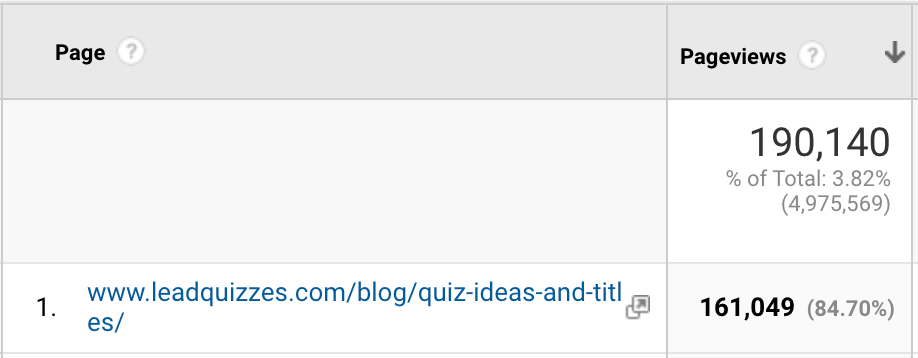
If you ask a typical SEO agency, they will tell you that you can expect the first results from an SEO marketing strategy in about 4-6 months. Depending on many factors, that time frame could be a lot shorter or longer.
One of those factors is competition. The more people try and rank for the same keywords as you do, the longer it will take to see the results and the better your content and link building efforts have to be.
A common mistake SEOs make with newer websites is going after popular keywords with a high search volume, hoping to get more search traffic. But in reality, low competition keywords can bring better results even more quickly.
Here is how you can use low competition keywords in your SEO strategy today.
What are low competition keywords?
Low competition keywords are those that have a low keyword difficulty score according to SEO tools such as Ahrefs or SEMRush. Or in layman’s terms, these are keywords that not many people are actively writing content for and building backlinks to.
On the other hand, high competition keywords are those that have lots of websites attempting to rank for them. There are many pages covering these keywords and ranking for one will take more time, effort, backlinks, and money compared to something with lower competition.
You may be thinking that higher competition means that this is the only good keyword type to go after. However, low competition keywords can yield great opportunities for good rankings and high-quality leads.
For the most part, these are top of the funnel or long-tail keywords that most businesses don’t want to go after. The main reason? They think these keywords won’t convert or they have low search volume estimates in Ahrefs, so they fly under the radar.
But in reality, Ahrefs traffic estimates aren’t always accurate.
Here is a keyword with an estimated 150 monthly search volume and traffic potential of up to 300 visits a month.

With my business, LeadQuizzes, we currently rank for this keyword in position 12:

And even though the page isn’t currently ranking very well, we still got 968 visits to this page in March 2023. Triple Ahrefs’ estimate for a top 10 ranking!
Over the past 6 years, that page did rank in the top 10 and cumulatively has driven over 160,000 pageviews! Best of all, this article consistently drives sign ups for us. It may not drive the same volume of signups as other bottom of the funnel keywords, but it’s still valuable!
As you can see, just because a keyword has low volume, it doesn’t mean that it’s not worth targeting. Low volume, low competition keywords can produce incredible results, as you can see from our own example.
Why are low competition keywords important?
There is a reason why some keywords are highly competitive. If a lot of businesses are trying to rank for them, these keywords drive not only relevant traffic but also conversions. On the other hand, low competition keywords can be an amazing strategy for your business as well.
- These keywords let you rank on the first page for them even if you have a new website that is not well-established. If you just recently launched a website, you’ll have an easier time ranking your new articles for these keywords.
On the other hand, higher difficulty keywords command a domain that is a bit more aged. Moreover, you’ll need to have topical authority, besides domain authority. In other words, you’ll need a few articles on sneakers for your new sneaker article to rank.
- You can get traffic and top-ranking pages without building many links. To rank for competitive keywords, you’ll need to do at least some link building. The top results usually have a high number of links pointing to them.On the other hand, low competition keywords have barely any links pointing to articles that cover them. This means that just having amazing content should often be enough to help you rank well with these low difficulty keywords.
- You’ll be able to create brand awareness and write about your brand more freely than you would with more competitive keywords. There is a higher chance to rank with content that is more promotional towards your brand compared to more popular keywords.
- Going after low competition keyword phrases helps you build links organically. Since there is not much (good) content around these topics, you can easily become an authoritative source that others will quote and link to.
- You can use this type of content across your marketing and sales. For example, a blog post covering a low competition keyword can become a newsletter that will go out to your target audience or a piece of sales collateral to use in calls. Just because it isn’t seen as highly valuable from an SEO standpoint, doesn’t mean it won’t be valuable to close deals.
- Content marketing pieces revolving around these keywords will help Google’s algorithm figure out what your website is about. The more content you build on a specific topic, the easier it becomes for Google to “understand” when the next piece of content comes out that it should rank for a specific keyword.This means less struggling with optimization and more focus on content creation and providing value for your customers. Ultimately, the more you publish, the more organic search traffic you’ll be able to pull in.
- Momentum. As you start publishing new content and getting traffic, impressions and conversions from it, this is incredibly motivating. It helps you build momentum and encourages you to work even more on your SEO/content marketing efforts.
How to find low competition keywords
Like any keyword research, it all starts with a blank document, in this case, an Excel spreadsheet.
Brainstorm content ideas in your space
First, you can brainstorm content ideas in your own space to get a fresh list of keywords to go after. Think about the search terms your customers use to find your product and do keyword research in Ahrefs starting from that and look at similar terms.
Or even better, take a look at your Google Search Console (it’s completely free!) and look at the keywords you’re already ranking for. You’re bound to find some gems here that will get you inspired for more keyword research.
Build a keyword master list
One of the troubles with low competition keywords is that there are quite a few of them to choose from. With hundreds to choose from, getting started can be a chore.
We were in the same boat a few years ago and this is when we created our keyword selection sheet (that you can copy). It’s a super simple Excel sheet with a few fields to enter your keyword data and this is what it looks like:

First, you add the keyword, then the accompanying metrics. Based on a mix of keyword difficulty, clicks and the importance that the keyword has for your business, the formula will give you a keyword score.
The higher the keyword score, the better. And the higher the score, the sooner you should start creating content around this keyword.
Of course, there are more nuances to this strategy. You should also consider the Importance to your business, the pain point the content solves, the search intent of that keyword (is it a signup based keyword or an information keyword) and more. However, the sheet above is an excellent starting point to choose your ideal search query for new content.
The main idea is to create this keyword sheet as a starting point so you can add more and more keywords as your research goes further. With a formula in place, you’ll easily determine which keywords are worth your time.
Do competitor keyword research
Using a tool such as Ahrefs, you want to load up your main competitors and take a peek at the keywords they are ranking for. Simply load up the URL in the website explorer and click on “Organic keywords”.

The list you’ll get is a useful starting point but not perfect, as it will give you ALL keywords your competitor is ranking for. Now, you need to filter that list to show only the low competition keywords. So, in Ahrefs, use filters to set some parameters:
- Low keyword difficulty (this is relative from one SEO to the next, but for this article, let’s say it’s under 30)
- Search volume and good traffic potential the more traffic the better. However, check the traffic potential for each keyword because you may be surprised at how low-volume keywords can produce healthy amounts of traffic.

At this point, your list becomes much cleaner and you’ll see keywords that are truly low competition. You can export this list or tweak it directly in Ahrefs, sorting it by search volume and keyword difficulty. This will produce the highest number of low competition keywords in the shortest possible time frame.
Google search results + Ahrefs Chrome toolbar
Google is also a great source of inspiration for keywords.
If you’re using Ahrefs (as we recommend as it’s easy to use and great value for the price), you should definitely install their Google Chrome extension. Once you google a keyword, the extension shows a list of related keyword ideas:

This can be of massive help if you’re stuck with your research.
However, you don’t need a paid app to get more out of Google. You can also look at the data that is already in the search results. For example, try playing with autocomplete in the search bar. As you start typing, Google will suggest the most commonly searched phrases starting with the keyword you entered.

But there are some more gold nuggets on that same page. As you enter a search term and look at the results, scroll down to the “People also ask” column:

This is guaranteed to give you some more keyword ideas that you can pull through your favorite SEO software and see their statistics.
All in all, there are lots of amazing and absolutely free ways to do research for low competition keywords. Even without an Ahrefs subscription, you’ll have plenty of materials here to get you inspired.
How to rank for low competition keywords
By default, ranking for low competition keywords is easier, since, well, the competition is low. It does not mean, however, that writing any piece of content on a low competition keyword will guarantee that it ranks.
Focus on quantity
When you’re just starting out, you’re probably not going to have the in-depth content and the editorial standards of Hubspot. And that’s okay since the bar is set pretty low. This allows you to aim for quantity, rather than quality, in the very beginning.
Monday.com is a great example of this – they were able to increase their organic traffic by 600% in two years. Their secret? Publishing 1,200 articles in 12 months, or about 100 articles a month. This strategy helped them grow their website to over 1.2 million organic visits per month.
You can create 50 articles in the time it takes an average digital marketing department to create 10, just by shifting your mentality to “better done than perfect”. With time, these pieces will start ranking and based on their performance, you can update and optimize them to get even better results.
Wrapping up
There are no shortcuts to winning in search engine results. However, using low competition keywords can be a quick way to advance in the SERPs without spending thousands on complex campaigns and waiting for months for your SEO results to kick in.
If you want to rule the search engine results with low volume keywords too, book a free consultation call with us to see how we can help you with your SEO and content needs.



